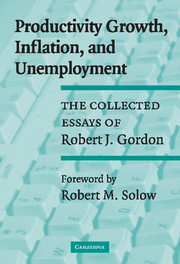Book contents
- Frontmatter
- Contents
- Foreword by Robert M. Solow
- Preface
- Introduction
- PART ONE THE HISTORY, THEORY, AND MEASUREMENT OF PRODUCTIVITY GROWTH
- PART TWO INTERPRETING PRODUCTIVITY FLUCTUATIONS OVER THE BUSINESS CYCLE
- PART THREE THE THEORY OF THE INFLATION-UNEMPLOYMENT TRADEOFF
- Part Three Introduction
- 10 Alternative Responses of Policy to External Supply Shocks
- 11 Supply Shocks and Monetary Policy Revisited
- 12 The Theory of Domestic Inflation
- 13 The Phillips Curve Now and Then
- PART FOUR EMPIRICAL STUDIES OF INFLATION DYNAMICS IN THE UNITED STATES
- Subject Index
- Author Index
10 - Alternative Responses of Policy to External Supply Shocks
Published online by Cambridge University Press: 10 December 2009
- Frontmatter
- Contents
- Foreword by Robert M. Solow
- Preface
- Introduction
- PART ONE THE HISTORY, THEORY, AND MEASUREMENT OF PRODUCTIVITY GROWTH
- PART TWO INTERPRETING PRODUCTIVITY FLUCTUATIONS OVER THE BUSINESS CYCLE
- PART THREE THE THEORY OF THE INFLATION-UNEMPLOYMENT TRADEOFF
- Part Three Introduction
- 10 Alternative Responses of Policy to External Supply Shocks
- 11 Supply Shocks and Monetary Policy Revisited
- 12 The Theory of Domestic Inflation
- 13 The Phillips Curve Now and Then
- PART FOUR EMPIRICAL STUDIES OF INFLATION DYNAMICS IN THE UNITED STATES
- Subject Index
- Author Index
Summary
During 1973 and 1974 reductions in supplies of food (through natural causes) and of oil (through unnatural causes) simultaneously lowered the real income of U.S. nonfarm workers and raised the rate of inflation. An inflation-cum-recession induced by lower supplies of raw materials may call for a policy response different from the traditional tonic of demand restriction called for by a “garden-variety” inflation generated by excess demand.
In light of the novelty of the 1974 situation, the sharp divergence of policy recommendations among economists is not surprising. Some analyzed the episode within the context of standard macroeconomic demand analysis, treating the 1973–4 acceleration of inflation as a delayed consequence of the acceleration in monetary growth during 1972, and the 1974–5 recession as a delayed consequence of the sharp deceleration in monetary growth that began in June 1974. The policy advice of this group, consisting largely of economists generally identified as “monetarists,” was to maintain a constant or even slightly reduced rate of growth of the money supply. Arthur Okun put forth the contrasting view that an attempt by policymakers to maintain fixed growth in nominal income ignored the “macroeconomic externalities” of commodity shortages: total real output falls by more than the decline in farm output, through an extra induced loss of nonfarm output. An implication of Okun's argument is that, while stabilization policy cannot recreate the lost farm output, it can minimize or eliminate the induced loss of nonfarm output by promoting a higher growth rate of nominal income.
- Type
- Chapter
- Information
- Productivity Growth, Inflation, and UnemploymentThe Collected Essays of Robert J. Gordon, pp. 313 - 331Publisher: Cambridge University PressPrint publication year: 2003



